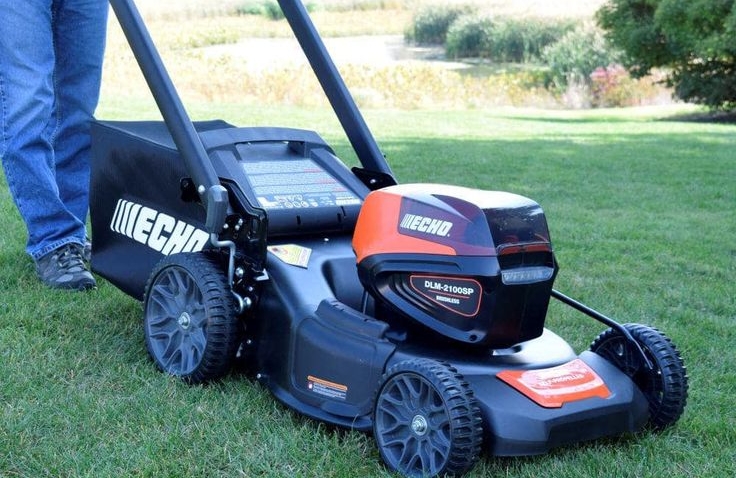
How Many Volts is a Lawnmower Battery: Explained
Types of Lawn Mower Batteries
How many volts is a lawnmower battery? Understanding the types of batteries used in lawn mowers is crucial for maintenance and replacement. Lawn mowers often use one of three types of batteries, which differ in terms of cost, maintenance, and performance.

Lead-Acid Batteries
Lead-acid batteries are common in lawnmowers, especially older models. They are reliable and provide enough power for most mowing needs. However, these batteries are quite heavy and need regular maintenance. To prevent damage and extend battery life, they must be kept charged and cleaned regularly.
Lithium-Ion Batteries
Lithium-Ion batteries are newer to the scene but are becoming popular due to their advantages. They are much lighter than lead-acid batteries and have a longer lifespan. They also charge quickly and require less maintenance. For those who want convenience and efficiency, lithium-ion batteries are a great choice. However, they come with a higher initial cost.
Nickel-Cadmium Batteries
Nickel-Cadmium (NiCd) batteries have been largely phased out and replaced by Nickel-Metal Hydride (NiMH) and Lithium-Ion batteries. NiCd batteries are known for their durability and ability to perform in a wide range of temperatures. Despite this, they are less environmentally friendly and can suffer from ‘memory effect’, which can reduce their effective capacity over time. Today, they are not as commonly used in lawn mowers due to the benefits that newer technologies provide.
Understanding the Voltage Range of Lawn Mower Batteries
Knowing the right voltage for your lawn mower battery is key to its performance. Voltage range impacts how well your mower starts and runs. Let’s look at the common voltages for lawn mower batteries and what they mean for your mowing needs.
Typical Voltages for Various Lawn Mower Models
Most lawn mowers, especially small riding mowers and push mowers, use 12 V batteries. These are sufficient for everyday yard work and are very common. Larger mowers might need 24 V batteries. These offer more power for big yards or tough grass. Remember, the right voltage ensures your mower starts easily and works efficiently. A mismatched voltage can lead to problems or even damage your mower’s engine.
Testing Your Lawn Mower Battery Voltage with a Multimeter
Properly testing the voltage of your lawn mower battery can save you from headaches down the line. Ensuring that your battery is operating at the correct voltage is key. A standard multimeter is all you need to reveal the health of your battery.
Steps to Test the Voltage
Testing your lawn mower’s battery is a simple process. Here’s a quick guide:
- Get a multimeter ready, set to measure DC volts (0-20V range).
- Make sure the lawn mower is off and give it an hour to rest before testing.
- Find the battery; it could be under the seat or near the motor.
- Check and clean the battery terminals for any dirt or corrosion.
- Connect the red probe to the positive terminal and the black to negative.
- Read the multimeter display. A good 12V battery should show 12.6-12.7 volts.
Interpreting Your Results
Once you have your reading, know what it means for your battery’s health:
- A range between 12.6 and 12.7 volts means your battery is healthy.
- Below 12 volts indicates it’s time to charge or possibly replace the battery.
- More than expected could suggest an overcharge situation.
If your battery consistently shows low voltage, your electrical system or alternator might need a check-up. Regular checks will help keep your mower starting easily and working at peak performance.
The Importance of Correct Battery Voltage in Lawn Mowers
How many volts is a lawnmower battery? Ensuring your lawn mower operates with the correct battery voltage is pivotal for optimal efficiency and longevity of mower parts. A mismatch in voltage can cause inefficiency and wear on lawn mower components, potentially leading to costly repairs.
Impact on Efficiency and Lawn Mower Parts
Correct battery voltage affects key areas of lawn mower performance:
- Starting Ability: The right voltage ensures the mower starts quickly and reliably. This is essential for a hassle-free mowing experience.
- Mower Health: Stable voltage levels maintain the health of the mower’s engine and electrical systems, preventing strain and possible malfunctions.
- Cutting Power: Adequate voltage provides the necessary power for blades to cut grass effectively, leading to a well-maintained lawn.
- Component Lifespan: Operating within the ideal voltage range minimizes stress on the alternator and other electrical components, extending their life and reducing the need for replacements.
- Safety: Correct voltage reduces the risk of overheating or electrical shortages, which can be dangerous.
By regularly testing and maintaining the proper voltage of your lawn mower’s battery, you safeguard its efficiency and protect its parts. This attention to detail ensures a smooth mowing experience and reduces the potential for unexpected issues that can interrupt your lawn care routine.

Battery Specifications and Their Significance
How many volts is a lawnmower battery? Understanding the specifications of lawn mower batteries is key to getting the most out of your mower. Two important specs to know are Cold Cranking Amps (CCA) and Amp-Hours (Ah). These tell you about the battery’s starting power and its capacity.
Cold Cranking Amps (CCA)
CCA measures a battery’s ability to start an engine in cold weather. For lawn mowers, this is crucial since a robust start is needed for the engine to run smoothly. A battery with a high CCA is better suited for cold climates. It ensures your mower starts without a hitch even on chilly mornings. Most lawn mowers require a battery with a CCA range of 130 to 150 to start reliably in cooler conditions.
Amp-Hours (Ah)
Ah indicates the battery’s storage capacity. It tells us how long the battery can run before it needs a charge. A battery with more Ah can last longer, reducing the frequency of charges. For instance, a typical 12 V battery with 35 Ah can run for about 35 hours at 1 amp of current or around 17.5 hours at 2 amps. Knowing the Ah helps you understand how much work you can do before needing a battery recharge.
Electric Start and Battery Usage in Gas-Powered Lawn Mowers
Electric start is a remarkable feature in modern gas-powered lawn mowers. This feature relies on a small, usually 12-volt, battery to power the starting mechanism. Unlike traditional pull-cord starts, an electric start makes beginning the mowing process smoother and more convenient. Even though gas powers the mower’s engine, the battery plays a critical role in ignition and, in some cases, operating on-board electronics.
Advantages of Electric Start in Gas-Powered Mowers
The benefits of electric start in gas-powered lawn mowers are significant. Here are a few key advantages:
- Ease of Use: Simply pressing a button to start the mower eliminates the physical strain associated with pull-start models. This feature is particularly beneficial for individuals with less upper body strength or mobility issues.
- Time-Saving: Electric starts allow for immediate engine ignition, saving valuable time, particularly for professionals or those with large lawns.
- Reduced Wear and Tear: Using an electric start reduces the wear by avoiding repeated manual attempts to start the engine.
- Enhanced Reliability: Electrical starts tend to be more reliable than manual starts, ensuring your mower starts on the first attempt, almost every time.
When considering lawn mower options, the convenience and reliability of electric start are compelling reasons to choose a model equipped with this modern amenity. And, maintaining the battery health ensures continuous, trouble-free use of your gas-powered mower.
Comparing Battery-Powered and Gas-Powered Lawn Mowers
How many volts is a lawnmower battery? When choosing a lawn mower, one key decision is between battery-powered and gas-powered models. Let’s discuss the distinctions and why they matter for your lawn care needs.
Pros of Battery-Powered Lawn Mowers
- Quiet Operation: They’re much quieter than their gas counterparts.
- No Emissions: Battery mowers don’t emit pollutants, making them eco-friendly.
- Ease of Maintenance: With fewer moving parts, they require less maintenance.
- No Fuel Costs: They eliminate the need to purchase gas.
Cons of Battery-Powered Lawn Mowers
- Limited Run Time: Batteries need recharging, limiting mowing time.
- Less Power: They may struggle with thick grass or large yards.
- Higher Initial Cost: Good quality battery mowers can cost more upfront.
Pros of Gas-Powered Lawn Mowers
- Extended Operation: Gas mowers run as long as there is fuel.
- More Power: They manage heavy-duty tasks better than battery models.
- Durability: A well-maintained gas mower can last for years.
Cons of Gas-Powered Lawn Mowers
- Noisy: They’re louder, which might be an issue in quiet neighborhoods.
- Emissions: Gas mowers produce exhaust, which isn’t eco-friendly.
- Maintenance: They require regular engine maintenance and fuel management.
In conclusion, your choice depends on your priorities. Battery-powered mowers are great for quiet, small lawns. Gas-powered mowers suit larger areas or tougher mowing tasks. Always consider lawn size, grass type, noise preference, and maintenance willingness when deciding.

Frequently Asked Questions About Lawn Mower Batteries
How many volts is a lawnmower battery? Navigating through the technicalities of lawn mower batteries can often lead to questions. We’ve compiled answers to some of the most frequently asked questions to help clarify common confusions.
Can I Use a Car Battery?
One might wonder whether a car battery is suitable for an electric lawnmower. The answer is no. Car batteries are not made for the specific electrical demands of electric lawn mowers. Lawn mower batteries, like AGM or Li-Ion, are designed to provide direct current efficiently and safely.
Are Lithium-Ion Batteries Better for Lawn Mowers?
Lithium-Ion (Li-Ion) batteries are favored for their longer run times and quicker recharge abilities. They trump other batteries, like NiMH or NiCd, in efficiency. This makes them preferable for modern lawn mowers, especially if you desire less downtime and more time mowing.
Battery Compatibility Across Power Tools
It might seem convenient to use the same type of battery for different power tools. However, each tool, including lawn mowers, has its unique voltage requirements. Always use the exact battery model recommended for your lawn mower to avoid damage and ensure optimal performance.












Leave a Reply